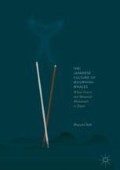Abstract
This chapter makes an overall assessment of the role religious beliefs played in Japanese people’s treatment of whales, and of how they dealt with the deaths of whales. It also considers how Japanese whaling culture—in which the Japanese not only received whales as blessings of the gods of the sea, consuming them with appreciation and utilizing every usable part, but also tending their deaths and their “afterlives”—could be applied to solve contemporary global issues such as the management and sustainable use of natural resources and the preservation of wildlife and its habitats.
Notes
- 1.
Kawamura Shigeyoshi, author interview, August 6, 2010.
- 2.
Ibid.
- 3.
Tsunoda Fusako, “Ōmi-jima: Nisō no iru chi no hate” (Ōmi Island: The Edge of the World Where Nuns Live), Tabi, September 1969, 72.
- 4.
Hosokawa Takao, “Kujira ni ‘kansha to ikei’ no nen” (Feelings of “Appreciation and Respect” for Whales), Mainichi Shimbun, October 26, 2010.
- 5.
Boreal Institute for Northern Studies, ed., Small-Type Coastal Whaling in Japan: Report of an International Workshop, Edmonton, Alberta: Boreal Institute for Northern Studies, the University of Alberta, 1988, 53–57, 61–62.
- 6.
Ibid., 62; Kon’no Tsutomu, Kaneko Misuzu futatabi (Revisiting Kaneko Misuzu), Tokyo: Shōgakukan, 2007, pbk., 2011, 214–215.
- 7.
Ibid. (both).
- 8.
Kumano Taiji-ura hogei-shi hensan-iinkai, ed., Kumano no Taiji: Kujira ni idomu machi (Taiji, Kumano: Town That Challenges Whales), Tokyo: Heibonsha, 1965, 24–26.
- 9.
Ibid.
- 10.
Ibid.; Boreal Institute for Northern Studies, 12.
- 11.
Ibid. (both).
- 12.
Watanabe Hiroyuki, Hogei-mondai no rekishi shakaigaku: Kingendai Nihon ni okeru kujira to ningen (Historical Sociology of Whaling Problems: Whales and People in Modern Japan), Tokyo: Tōshindō, 2006, 17–56.
- 13.
Ibid., 32–33, 57–58, 72; Jun Morikawa, Whaling in Japan: Power, Politics, and Diplomacy, New York: Columbia University Press, 2009, 21–23.
- 14.
Morikawa, 23–28.
- 15.
Ibid., 28–30, Boreal Institute for Northern Studies, 14–15, 67–70.
- 16.
Ibid. (both).
- 17.
Morikawa 30–33; Boreal Institute for Northern Studies, 94.
- 18.
Ibid.
- 19.
Boreal Institute for Northern Studies, 18–25.
- 20.
Komatsu Masayuki, Sekai kujira sensō (World War on Whales), Tokyo: PHP kenkyūjo, 2010, 197–218; “Komatsu Masayuki-shi wa Beikoku no atsuryoku de kōshō kara hazusareta” (Mr. Komatsu Masayuki Removed from Negotiations by U.S. Pressure), October 22, 2005, http://blog.livedoor.jp/standupjoe1/archives/50121502.html
- 21.
Ibid. (both).
- 22.
Ibid. (both); Isao Miyaoka, “State-Society Relations Under Foreign Pressure: Two Contrasting Cases in the Japanese Fisheries Policy,” http://www.dijtokyo.org/doc/dij-jb_11-miyaoka.pdf, downloaded February 24, 2016. For details of gaiatsu (foreign pressure) politics, see Kent E. Calder, “Japanese Foreign Economic Policy Formation: Explaining the Reactive State,” World Politics, Vol. 40, No. 4, July 1988, 517–541.
- 23.
Arne Kalland, “Holism and Sustainability: Lessons from Japan,” Worldviews: Global Religions, Culture, and Ecology (2002), Vol. 6, No. 2, 145–158. For detail, see Patricia J. Asquith and Arne Kalland, Japanese Images of Nature: Cultural Perspectives, Richmond, Surrey, UK: Curzon Press, 1997.
- 24.
Ibid.; Kumi Kato, “Prayers for the Whales: Spirituality and Ethics of a Former Whaling Community—Intangible Cultural Heritage for Sustainability,” International Journal of Cultural Property (2007), No. 14, 283–313.
- 25.
Boreal Institute for Northern Studies, 79–84.
Author information
Authors and Affiliations
Rights and permissions
Copyright information
© 2018 The Author(s)
About this chapter
Cite this chapter
Itoh, M. (2018). Conclusion. In: The Japanese Culture of Mourning Whales. Palgrave Macmillan, Singapore. https://doi.org/10.1007/978-981-10-6671-9_10
Download citation
DOI: https://doi.org/10.1007/978-981-10-6671-9_10
Published:
Publisher Name: Palgrave Macmillan, Singapore
Print ISBN: 978-981-10-6670-2
Online ISBN: 978-981-10-6671-9
eBook Packages: Social SciencesSocial Sciences (R0)

